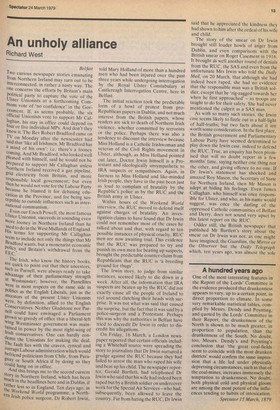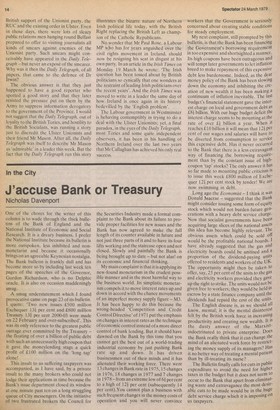An unholy alliance
Richard West
Belfast Two curious newspaper stories emanating from Northern Ireland may turn out to be interconnected, in rather a nasty way. The one concerns the efforts by Britain's main Political party to capture the vote of the Ulster Unionists at a forthcoming Commons vote of `no confidence' in the Government. If, as seems probable, the six Official Unionists vote to support Mr Callaghan, his stay in office could depend on • four or five individual MPs. And don't they know it. The Rev Robert Bradford came on TV on Monday after the newscaster had said that `like all Irishmen, Mr Bradford has a mind of his own': i.e. there's a looney coming. And Mr Bradford, who looked well Pleased with himself, said he would not be Prepared to support Mr Callaghan unless Northern Ireland received a gas pipeline, grid electricity from Britain, and more responsible local government; but even then he would not vote for the Labour Party because he blamed it for debasing education in the Province, and for being susceptible to outside influences such as international communism.
Even our Enoch Powell, the most famous Ulster Unionist, succeeds in sounding even more looney in Northern Ireland than he used to do in the West Midlands of England. His terms for supporting Mr Callaghan seem to include not only the things that Mr Bradford wants, but a monetarist economic Policy, and Britain's withdrawal from the EEC.
The Irish, who know the history books, are quick to point out that their ancestors, such as Parnell, were always ready to take advantage of their parliamentary strength at Westminster; however, the Parnellites were in most respects on the same side in Politics as the English Liberals, just as the ancestors of the present Ulster Unionists ,.,Were, by definition, allied to the English Conservatives. Neither Gladstone nor Parnell could have envisaged a Parliament grown so greedy of office that a liberal-left wing Westminster government was maintained in power by the most right-wing of Irish conservatives. One can hardly con demn the Unionists for making the deal. The fault lies with the craven, cynical and corrupt Labour administration which would befriend politicians from Chile, from Paraguay or South Africa if by doing so they could hang on in office. And this brings me to the second current story in Northern Ireland, which has been Much in the headlines here and in Dublin, if rather less so in England. Ten days ago, in the Weekend World programme, a Northern Irish police surgeon, Dr Robert Irwin, told Mary Holland of more than a hundred men who had been injured over the past three years while undergoing interrogation by the Royal Ulster Constabulary at Castlereagh Interrogation Centre, here in Belfast.
The initial reaction took the predictable form of a howl of protest from proRepublican papers in Dublin, and not much interest from the British papers, whose readers are sick to death of Northern Irish violence, whether committed by terrorists or the police. Perhaps there was also a tendency to discount the interview because Miss Holland is a Catholic Irishwoman and veteran of the Civil Rights movement in Ulster, although, as Miss Holland pointed out later, Doctor Irwin himself is a Protestant and ideologically unsympathetic to IRA suspects or sympathisers. Again, in fairness to Miss Holland and like-minded Irish people, they have in the past been just as loud to complain of brutality by the Republic's police as by the RUC and the British army in Ulster.
Within hours of the Weekend World interview, the RUC moved to defend itself against charges of brutality. An investigation claims to have found that Dr Irwin could not remember most of the cases he talked about and that, with regard to ten possible instances of physical cruelty, RUC men are now awaiting trial. This evidence that the RUC was prepared to try and punish its own men for beating up suspects, brought the predictable counter-claim from Republicans that the RUC is `a breeding ground for thugs'.
The Irwin story, to judge from similar instances, seemed likely to die down in a week. After all, the information that IRA suspects are beaten up by the RUC did not exactly cause all the people of Ireland to reel around clutching their heads with sur prise. It was not what was said that caused the surprise, but the fact that it was said by a police-surgeon and a Protestant. Perhaps this was why the authorities in Belfast have tried to discredit Dr Irwin in order to discredit his allegations.
On Friday, 16 March, a London newspaper reported that certain officials includ ing a Whitehall source were spreading the story to journalists that Dr Irwin nurtured a grudge against the RUC because they had failed to arrest the man who raped his wife and beat up his child. The newspaper reporter, Gerald Bartlett, had telephoned Dr Irwin who said that his wife had indeed been raped but by a British soldier on undercover work for the Special Air Services— who had, subsequently, been allowed to leave the country. Far from hating the RUC, Dr Irwin said that he appreciated the kindness they had shown to him after the ordeal of his wife and child.
The story of the smear on Dr Irwin brought still louder howls of aiiger from Dublin, and even comparisons with the British smear on Roger Casement in 1916. It brought as well another round of denials from the RUC, the SAS and even from the unfortunate Mrs Irwin who told the Daily Mail, on 20 March, that although she had indeed been taped, she had no evidence that the responsible man was a British soldier, except that he `zig-zagged towards her when he first approached' — as troops are taught to do for their safety. She had never mentioned the culprit as a SAS man.
As with so many such stories, the Irwin case seems likely to fizzle out in a half-light of half-truths; but two facts about it are worth some consideration. In the first place, the British government and Parliamentary Labour Party have seemed determined to play down the Irwin case, indeed to defend the RUC. True, an enquiry has been promised that will no doubt report in a few months' time, saying neither one thing nor the other, and giving offence to no one. If Dr Irwin's statement has shocked and amazed Roy Mason. the Secretary of State for Northern Ireland, then Mr Mason is adept at hiding his feelings. Even James Callaghan, who himself was once respons ible for Ulster, and who, as his name would suggest, was once the darling of the oppressed Catholic communities of Belfast and Derry, does not sound very upset by this latest report on the RUC.
Odder still, the British newspaper that published Mr Bartlett's story about the smear on Dr Irwin was not, as one might have imagined, the Guardian, the Mirror or the Observer but the Daily Telegraph which, ten years ago, was almost the sole British support of the Unionist party, the RUC and the existing order in Ulster. Even in those days, there were lots of sleazy public relations men hanging round Belfast prepared to offer to visiting journalists all kinds of smears against enemies of the Unionist party. Such smears might conceivably have appeared in the Daily Telegraph —but never an exposé of the smearer. Why was it then the Daily Telegraph, of all papers, that came to the defence of Dr Irwin?
The obvious answer is that they just happened to have a good reporter who spotted a good story and that they later resisted the pressure put on them by the Army to suppress information derogatory to the government of the Province. I would not suggest that the Daily Telegraph, out of loyalty to the British Tories, and hostility to the British Socialists, was running a story just to discredit the Ulster Unionists and their friend Mr Mason. After all, the Daily Telegraph was itself to describe Mr Mason as 'admirable' in a leader this week. But the fact that the Daily Telegraph ran this story illustrates the bizarre nature of Northern Irish political life today, with the British Right replacing the British Left as champion of the Catholic Republicans.
No wonder that Mr Paul Rose, a Labour MP who has for years anguished over the civil rights movement in Ireland, should now be resigning his seat in disgust at his own party. In an article in the Irish Times on Monday 19 March he wrote: 'The Irish question has been tossed about by British politicians so cynically that one wonders at the restraint of leading Irish politicians over the recent years'. And the Irish Times was moved to write in a leader the same day of how Ireland is once again in its history bedevilled by the 'English problem'.
The Labour government in Westminster is behaving contemptibly in trying to do a deal with the Ulster Unionists; yet, a final paradox, in the eyes of the Daily Telegraph, most Tories and some quite independent observers, it has been in his handling of Northern Ireland over the last two years that Mr Callaghan has achieved his only real success.



































 Previous page
Previous page